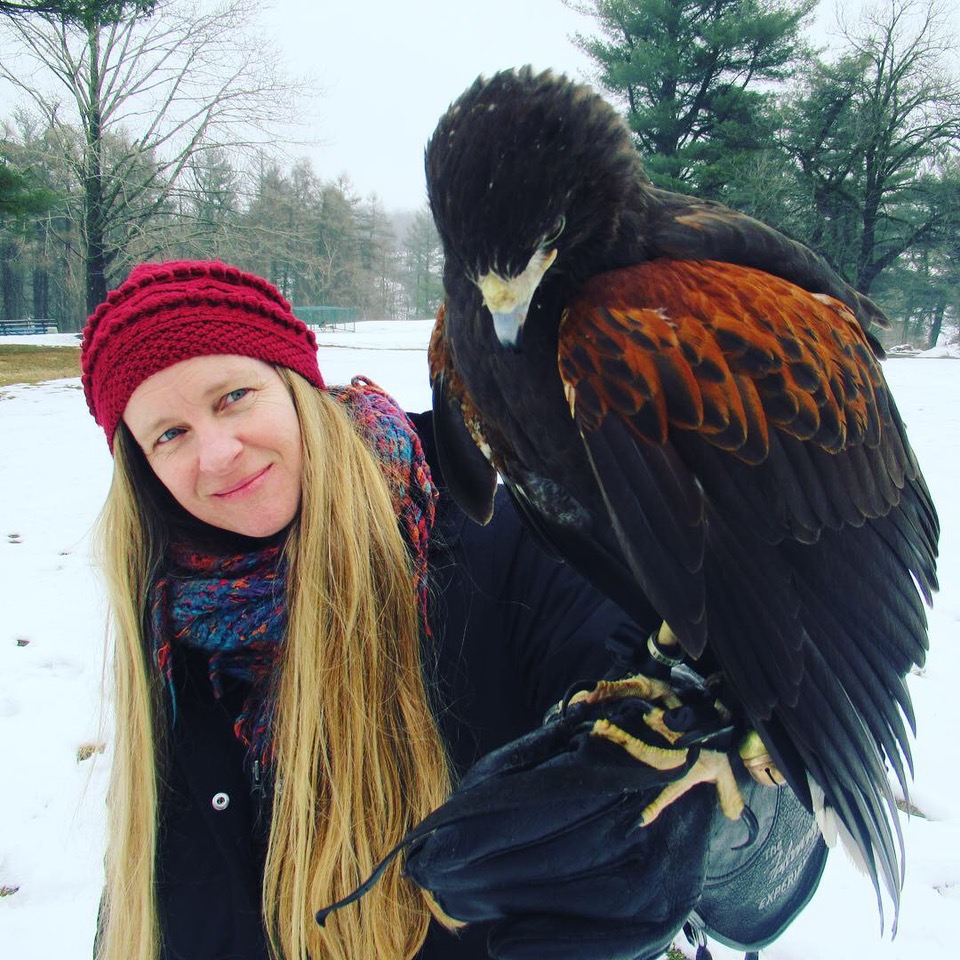by Allison Cobb
Wifthing
Pattie McCarthy
Apogee Press
When it comes to gender relations, some things have not changed much since the Middle Ages, a point that Pattie McCarthy draws forth in virtuosic verse across a series of three sonnet sequences in her latest book Wifthing.
 The women in the book—Margery Kempe, Margaret Beaufort, the goodwives of the Salem witchcraft hysteria—all appear in history because they transgressed in some way the bonds placed on female beings. Women in the long sweep of English history existed not as individuals but as a function of their relation to men: “doughter & heyr/ wyff of,” or as objects of use in the production and reproduction of male power: through marriage becoming “a treaty that walks & talks & breathes” or as mother: “she makes her body/ making other bodies.”
The women in the book—Margery Kempe, Margaret Beaufort, the goodwives of the Salem witchcraft hysteria—all appear in history because they transgressed in some way the bonds placed on female beings. Women in the long sweep of English history existed not as individuals but as a function of their relation to men: “doughter & heyr/ wyff of,” or as objects of use in the production and reproduction of male power: through marriage becoming “a treaty that walks & talks & breathes” or as mother: “she makes her body/ making other bodies.”
The poems bear witness to the brutality inherent in reducing female beings to things, but they also celebrate the ways in which women work within the political and religious strictures of the day to claim power and define themselves in the face of a culture that aims to erase, dismember, and destroy them. McCarthy evokes the Roman Empress Faustina as a potent symbol of violence and the resistance against it, which imbued these women in the eyes of a misogynist culture with monstrous, supernatural powers, as bitchwitches: “empress faustina beheaded/ blindfolded reaching for her crown on her knees.”
Across 80 unpunctuated sonnets, McCarthy shuffles and reorders repeating phrases and lines, as if in the tight confines of the sonnet form, re-sorting the historical evidence, re-seeing it from new angles, might reveal more glimpses of the living beings the misogynist histories debase and distort.
The sonnets meditate on what it was like to be Elizabeth Wydeville, considered to have bewitched the king of England into marriage, her sons later murdered in struggles for the English throne, and what that grief must have meant for her (“where was her witchcraft then”). Another major figure in the sonnets is Mary Beaufort, married at age 12 to Edmund Tudor, who was 24. The histories record that she had a divine vision that guided her to marry him, but McCarthy questions her agency in this—it was a marriage made to strengthen the Tudor claim to the throne. Edmund died a year later and left Elizabeth a 13-year-old widow, pregnant. McCarthy dwells on this, a recurring theme throughout the sonnets—what it meant for the women in their physical bodies to be used as instruments of political will:
“one effective way to
justify fucking a twelve year old girl
is to have a vision for her to have
a vision that gives you her body her
money her land her long family even
if she predeceases you if she has a child
by right of courtesy of England everything
hers is yours but you will die first & she will
give birth scared & small & thirteen to the future”
The point of the sonnets is not to dwell in medieval English history but to show how this long history of objectification and erasure continues to reach cold tendrils through living bodies, so that what women can think and feel about themselves remains distorted, seen through the male gaze of power as monstrous.
The speaker’s daughter asks how babies are made and the speaker replies: “they’re made when a tudor twice/ your age fucks you you’ve got to lean/ into it.” The words highlight that women’s agency over their own sexuality and reproduction remains at risk—a harsh warning to a still innocent daughter. The suggestion is that innocence is a luxury not possible in a misogynist society. It is also a biting critique of the “lean into it” credo of women in power like Facebook’s Sheryl Sandberg who internalize the abuses of heteropatriarchal capitalism.
The sonnets also reveal glimpses of what it is to be a 21st century “goodwyf” and mother, and the ways that the culture continues to sexualize, deify, and erase such figures. The result is a paradox probably familiar to any objectified body—scrutinized as a potentially threatening or gratifying sexual object while being rendered invisible as a living individual:
“my invisible scrutinized midlife
goodwyf body minivan & tankini”
The medical technical jargon that the speaker encounters in the 21st century is just as erasing and objectifying as the medieval religious and legal discourses and physical examinations of the accused witches of Salem:
“I am dissolved an odd language speak it
there is a question as to whether its
echotexture is slightly coarsened”
We learn from the notes that the echotexture line is “from the radiologist’s notes on a transvaginal ultrasound of my uterus”—the oddly beautiful, bewildering description and the medical examination both a violation and potential threat, in the same way that the physical examinations of the accused witches of Salem revealed supposed physical oddities associated with the feminine and animal “teats & nibbs & unusual flesh.” McCarthy underlines this continuity: “I’m/ never more confessional than when I/ write about Salem & share facts with you.”
The death tendrils of racism reach forward from this history also. McCarthy’s speaker describes a contemporary plaque at Salem Village that marks the house where an enslaved woman, “tituba” supposedly told stories of witchcraft that sparked the hysteria. The speaker points out there is no contemporary evidence for the blame placed on this Black female and notes instead that a few women “fell ill/ here & men declared them bewitched,” perhaps because they were afraid of the female body, and its “great, heavy, unbeautiful clots.”
The poems’ urgency, drama, and poignancy derive from the connections—visceral, embodied—among these individuals across centuries. Pain, bleeding, childbirth, sickness, grief, even joy—these transcend the histories and draw the lives of the women together. In a sonnet written on Feb. 14, 2018, the day of the shooting at Stoneman Douglas High School, the speaker calls for living all of life in a permanent lockdown so that she might always know where her children are, an impossible “protective domestic magic.” It is the same kind of magic Elizabeth Wydeville might have wished to keep her sons safe.
The sonnet following “permanent lockdown” weaves the lives of the women together more directly as an incantation in repeated “we” phrases: “we dirty thing we different bodies …/ we dazzle we erasure we hungry.” It ends with “we countermagic”—as if the women could, as a “we,” conjure the supernatural witchy powers the culture ascribes to them. And they do have powers, as forces of healing and care. One sonnet lists “things I can fix”: including “injuries/ due to football regular & American/ the alphabetization of books by/ genre grilled cheese witch[which? just checking] cakes stained laundry/ I can fix nightmares of all kinds with song,” but the poem ends with a mournful humanity “I can fix a hole though this fix won’t hold.” That hole, the unrecoverability of the women’s lives, the loss and lack—ultimately the poems revolve around this unhealable gap, except for this: It is the women—bloody, transgressing, clotting women—who give birth to a human future.
•
Read Allison Cobb’s review of Pattie McCarthy’s Nulls from Boog City 87 (page 6):
www.boogcity.com/boogpdfs/bc87.pdf
 ALLISON COBB (pronouns she/her) is the author of Plastic: An Autobiography from Nightboat Books. Her other books include After We All Died (Ahsahta Press), Born2 (Chax Press), and Green-Wood, originally published by Factory School with a new edition in 2018 from Nightboat.
ALLISON COBB (pronouns she/her) is the author of Plastic: An Autobiography from Nightboat Books. Her other books include After We All Died (Ahsahta Press), Born2 (Chax Press), and Green-Wood, originally published by Factory School with a new edition in 2018 from Nightboat.
Cobb’s work has appeared in Best American Poetry, Denver Quarterly, Colorado Review, and many other journals. She was a finalist for the Oregon Book Award and National Poetry Series, has been a resident artist at Djerassi and Playa, and received fellowships from the Oregon Arts Commission, the Regional Arts and Culture Council, and the New York Foundation for the Arts. She lives in Portland, Ore. www.allisoncobb.net/
PATTIE MCCARTHY (aprweb.org/poems/intertidal-ordinary) is the author of seven books of poetry, including wifthing (Apogee Press). She teaches literature and creative writing at Temple University.

